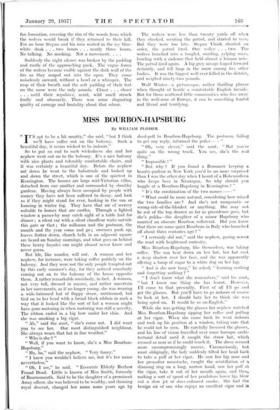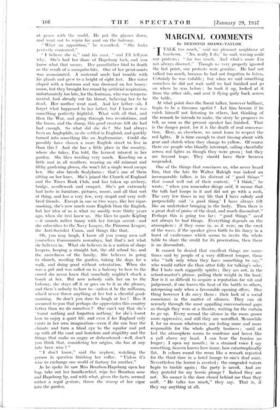MISS BOURBON-HAPSBURG
By WILLIAM PLOMER
" IT'S apt to be a bit smutty," she said, "but I think we'll have coffee out on the balcony. Such a beautiful day, it seems wicked to be indoors."
So to 'put an end to such wickedness she and her nephew went out on to the balcony. It's a nice balcony with nice plants and tolerably comfortable chairs, and it was certainly a beautiful day. Before the nephew sat down he -went to the balustrade and looked up and down the street, which is one of the quietest in Kensington. The houses are large- mid-Victorian villas, detached from one another and surrounded by shrubby gardens. Having always been occupied by people with money they have not been suffered to decay, and look as if they might stand for ever, basking in the sun or looming in winter fog. They have that air of secrecy suitable to homes that are castles. Through a lighted window a passer-by may catch sight of a table laid for dinner ; a silent car with a silent chauffeur waits outside this gate or that ; the milkman and the postman, the month and the year come and go ; crocuses push up, leaves flutter down, church bells in an adjacent square are heard on Sunday mornings, and what goes on behind these heavy facades one might almost never know and never guess.
But life, like murder, will out. A woman and her nephew, for instance, were taking coffee publicly on the balcony. And they were not the only people tempted out by this early summer's day, for they noticed somebody coming out on to the balcony of the house opposite them. A rather remarkable somebody, in fact. A woman, not very tall, dressed in mauve, and rather uncertain in her movements, as if no longer young, she was wearing a wide-brimmed hat of floppy straw, untrimmed, but tied on to her head with a broad black ribbon in such a way that it looked like the sort of hat a woman might have gone motoring in when motoring was still a novelty. The ribbon ended in a big bow under her chin. And she was smoking a big cigar.
" Alt," said the aunt, " she's come out. I did want you to see her. Our most distinguished neighbour. She always wears that hat in fine weather."
"Who is she ? "
" Well, if you want to know, she's a Miss Bourbon- Hapsburg." " Ha, ha," said the nephew. " Very funny."
" I knew you wouldn't believe me, but it's her name nevertheless."
" Oh, I see," he said. " Eccentric Elderly Recluse Found Dead. Little is known of Miss Smith, formerly of Bournemouth. Said to be the daughter of a prominent Army officer, she was believed to be wealthy, and claiming royal descent, changed her name some years ago by deed-poll to Bourbon-Hapsburg. The postman, failing to get any reply, informed the police 17 " Oh, very clever," said the aunt. " But you're quite on the wrong track. You see, she's the real thing."
" Impossible ! "
" But why ? If you found a Romanov keeping a beauty-parlour in New York you'd be no more surprised than I was the other day when I heard of a Hohenzollern who keeps bees in Nicaragua. So why should you boggle at a Bourbon-Hapsburg in Kensington ? "
" It's the combination of the two names — " " What could be more natural, considering how mixed the two families are ? And she's not morganatic or wrong-side-of-the-blanket or anything. She may not be out of the top drawer as far as precedence goes, but she's pukka—the daughter of a minor Hapsburg who married an obscure Bourbon collateral. Did you know that there are some quiet Bourbons in Italy who branched off about three centuries ago ? "
" I certainly did not," said the nephew, gazing across the road with heightened curiosity.
Miss Bourbon-Hapsburg, like themselves, was taking coffee. The sun beat down on her hat, her hat cast a deep shadow over her face, and she was apparently offering a lump of sugar to a white dog on her lap.
" And is she now busy," he asked, " learning nothing and forgetting nothing ? "
" I don't know what she remembers," said his aunt, " but I know one thing she has learnt. However, I'll come to that presently. First of all I'll go and get the glasses. But you'll have to go indoors of course to look at her. I should hate her to think she was being spied on. It would be so un-English."
While she was getting the glasses her nephew watched Miss Bourbon-Hapsburg sipping her coffee and pulling at her cigar. When she came back he went indoors and took up his position at a window, taking care that he could not be seen. He carefully focussed the glasses, and his line of vision travelled over some baroque archi- tectural detail until it caught the straw hat, which seemed as near as if he could touch it. The dress seemed more uncompromisingly mauve. Unconsciously, but most obligingly, the lady suddenly tilted her head back to take a puff at her cigar. lie saw her big nose and her grenadier moustache, caught the scintillation of a diamong ring on a long, narrow hand, saw her pull at the cigar, take it out of her mouth again, and then, making a sort of spout of her pendulous lower lip, blow out a slow jet of dove-coloured smoke. She had the benign air of one who enjoys an excellent cigar and is at peace with the world. He put the glasses down, and went out to rejoin his aunt on the balcony.
" What an apparition," he remarked. " She looks perfectly contented."
" I believe she is," said his aunt, " and I'll tell you why. She's had her share of llapsburg luck, and you know what that means. Her grandfather bled to death as the result of a mosquito-bite. One of her great-aunts was assassinated. A maternal uncle had trouble with his glands and grew to a height of eight feet. Her sister eloped with a footman and was drowned on her honey- moon, but they brought her round by artificial respiration, unfortunately too late, for the footman, who was tempera- mental, had already cut his throat, believing her to be dead. Her mother went mad. And her father—oh, I forget what happened to her father, but I know it was something perfectly frightful. What with all that, and then the War, and going through two revolutions, and the boom, and the slump, this good creature felt she had had enough. So what did she do ? She had always been an Anglophile, so she settled in England, and quickly turned into something like an Anglomaniac. Could she possibly have chosen a more English street to live in than this ? And she has a little place in the country, where she takes, I'm told, the keenest interest in her garden. She likes weeding very much. Kneeling on a little mat in all weathers, wearing an old raincoat and filthy gardening gloves, she won't let a single weed escape her. She also breeds Sealyhams : that's one of them sitting on her knee. She's joined the Church of England and the Times Book Club, and has taken up archery, bridge, needlework and croquet. She's got extremely bad taste in furniture. pictures, music, and all that sort of thing, and has a very few, very stupid and very well- bred friends. Except in one or two ways, like her cigar- smoking, she's now much more English than the English, but her idea of us is what we mostly were thirty years ago, when she first knew us. She likes to quote Kipling —it sounds rather funny with her foreign accent—and she subscribes to the Navy League, the Primrose League, the Anti-Socialist Union, and things like that.
Oh, you may laugh, I know all you young men call yourselves Communists nowadays, but that's not what she believes in. What she believes in is a nation of shop- keepers, keeping a straight bat, the old school tic, and the sacredness of the family. She believes in going to church, weeding the garden, taking the dogs for a walk, and doing good without ostentation. When she was a girl and was called on to a balcony to bow to the crowd she never knew that somebody mightn't chuck a bomb at her. But now nobody calls her on to the balcony, she stays off it or goes on to it as she pleases, and there's nobody to bow to—unless it be the milkman, who'd never throw anything at her but a cheerful good- morning. So don't you dare to laugh at her ! Has it occurred to you that perhaps she appreciates this country better than we do ourselves ? One can't say that she's ' learnt nothing and forgotten nothing,' for she's learnt how to enjoy a quiet life, and even if her England only exists in her own imagination—even if she can bear the climate and turn a blind eye to the squalor and put tip with all the cant and boredom and stupidity and the things that make us angry or disheartened—Well, don't you think that, considering her origins, she has at any rate been wise ? "
" I don't know," said the nephew, watching the person in question finishing her coffee. " Unless it's wise to exchange one world of fantasy for another."
As he spoke he saw Miss Bourbon-Hapsburg open her hag, take out her handkerchief, wipe her Bourbon nose and Hapsburg lip, and with what, given the facts, seemed rather a regal gesture, throw the stump of her cigar into the garden.























































 Previous page
Previous page